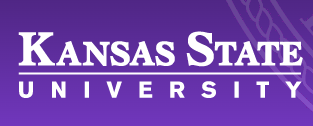
RAFAEL GARCIA
K-State News and Communications
MANHATTAN, Kan. — Kansas State University researchers Eduard Akhunov and Bimal Paul have been selected as 2024 American Association for the Advancement of Science Fellows in recognition of their significant contributions to their fields.
Akhunov — university distinguished professor of plant pathology and Bikram S. Gill Chair in Wheat Genetics — was cited in his selection "for development and use of resources for understanding wheat genome diversity and evolution, and for identification of novel genes for wheat improvement, including combating the important wheat stem rust pathogen."

"I feel deeply honored to be selected as an AAAS Fellow," said Akhunov, who is also director of K-State's Wheat Genetics Resource Center. "I am grateful that the tremendous work carried out by my former and current research team members, as well as our collaborators, is being recognized by our peers."
Paul, professor of geography and a Fulbright-Flex Senior Fellow, was recognized "for distinguished contributions to the field of human geography, particularly human adjustment to natural hazards."
"I've dreamed of being selected as an AAAS Fellow ever since I arrived at K-State in 1990," Paul said. "Through both theoretical and empirical research, I have contributed to my field by integrating social sciences and humanities with the physical sciences to address environmental concerns effectively and holistically, including various dimensions of nature-society interactions."
Elected each year by the AAAS Council, new fellows receive a certificate and a blue-and-gold rosette pin at the association's annual Fellows Forum, held this year in June in Washington, D.C.
As new inductees into the world's largest general scientific society, Akhunov and Paul join a distinguished cohort of scientists, engineers and innovators, including 26 current and emeritus K-State faculty.
"Being named a 2024 Fellow of the American Association for the Advancement of Science is a well-deserved recognition of the groundbreaking contributions Drs. Akhunov and and Paul have made in their fields," said Hans Coetzee, interim vice president for research. "Their dedication to discovery and innovation continues to shape the future of science and society, and we are proud to have them at K-State."
Akhunov is one of the world’s top experts in wheat genetics, leading research that combines cutting-edge technologies with data science to leverage diversity of the wild ancestors of wheat to improve this important crop.
His team of researchers at the Wheat Genetics Resource Center — which maintains nearly 4,000 specimens from 38 wild wheat species — uses techniques such as genomics, bioinformatics and digital imaging technologies to uncover genetic traits in ancient grains that enhance grain quality, pathogen resistance and resilience to drought and heat stress.
"Our work is helping to reintroduce these traits from wild ancestors into modern breeding programs, accelerating the development of improved wheat varieties," Akhunov said.
Akhunov began his study of genetics and the diversity of wheat and its wild relatives as a postdoctoral researcher at the University of California Davis, where he joined a research team that began developing the first high-density maps of wheat genes and novel tools for characterizing genetic diversity in wheat. That work played a critical role in sequencing the wheat genome, particularly in identifying and characterizing genes that protect wheat against pathogens, increase yield and improve grain quality.
Since he arrived at K-State in 2007, Akhunov has advised more than two dozen graduate students and postdoctoral scholars. He has led nearly $40 million in funded research with support from the wheat industry and organizations such as the U.S. Department of Agriculture's National Institute of Food and Agriculture, the USDA Agricultural Research Service, the National Science Foundation, the Kansas Wheat Commission, and the Bill and Melinda Gates Foundation.
funded research with support from organizations such as the U.S. Department of Agriculture's National Institute of Food and Agriculture, the National Science Foundation, the Kansas Wheat Commission, and the Bill and Melinda Gates Foundation.
Akhunov's research has been published in more than 90 peer-reviewed papers and several book chapters, and he has received a patent and more than 100 speaking invitations.
Paul is a world-leading scholar on disasters, hazards and health. He is known for offering deeper understandings of complex issues and debunking long-held myths relating to disaster response and recovery, both inside and outside of academia.

"Globally, there are an average of around 6,800 natural disaster events recorded each year," Paul said. "These disasters kill thousands of people every year, with another 120 million people being directly affected. The international community annually spends $30 billion addressing these events. My research significantly decreases disaster damage by informing preparation work, encouraging adaptations and humanitarian assistance, reducing human suffering from disasters, and saving lives across the globe, including in Kansas."
Paul's interest in disasters began after Bangladesh experienced a Category 5-equivalent tropical cyclone in 1991 that killed nearly 140,000 people. With funding from the Natural Hazards Center at the University of Colorado at Boulder, Paul found a spark that guided him to study natural hazards, ultimately studying tornados and other natural disasters in Kansas, Missouri, Colorado and Tennessee.
His current work particularly focuses on the intersection of disasters and health, including diseases and illnesses after disaster events.
In addition to giving invited talks in various Asian countries, Paul has been an external reviewer on 23 dissertations at universities around the world. Paul is the author or co-author of various articles, book chapters and seven books, including "The Routledge Handbook of Disaster Response and Recovery" that was published in March.





